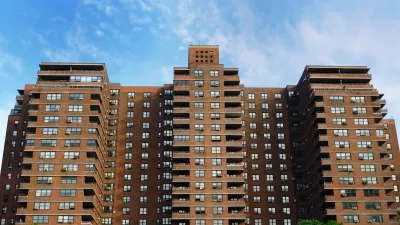Conventional planning think says that mixed-income development benefits low-income neighborhoods. But a survey finds that residents of public housing in New York don't agree—rather, they feel left behind by newcomers to the neighborhood.
Greg B. Smith reports on a study by Abt Associates and New York University's Furman Center for Real Estate, commissioned by the city of New York, about the impacts of gentrification on residents of New York City Housing Authority buildings. According to Smith, the report "reached a conclusion most New Yorkers already accept as true: gentrification doesn't help the poor."
"The study, 'The Effects of Neighborhood Change on NYCHA Residents' [pdf]…found that NYCHA tenants often wind up feeling like aliens in their own neighborhoods, surrounded by newcomers who claimed they'd just 'discovered' the neighborhood."
The study, released in May, runs counter to the narrative about the benefits of developing new mixed-income housing in low-income neighborhoods. During the same month, the de Blasio Administration announced "a controversial plan to build hundreds of market-rate apartments on 'underutilized' NYCHA property," according to Smith.
NYCHA spokesperson Aja Worthy-Davis noticed the difference, releasing this statement about the goals of the proposal to build more units on NYCHA properties: "By building both affordable and mixed-income housing, we will protect NYCHA housing, expand affordable housing options for everyday New Yorkers, and bring small businesses and services like supermarkets and restaurants closer to NYCHA developments….We will in turn use this growth to connect NYCHA residents to new employment opportunities."
The article includes a lot more detail about the study and its implications for New York and on the debate about investment in low-income neighborhoods.
FULL STORY: EXCLUSIVE: NYCHA residents see little benefit from gentrification in their neighborhoods, report shows

Alabama: Trump Terminates Settlements for Black Communities Harmed By Raw Sewage
Trump deemed the landmark civil rights agreement “illegal DEI and environmental justice policy.”

Study: Maui’s Plan to Convert Vacation Rentals to Long-Term Housing Could Cause Nearly $1 Billion Economic Loss
The plan would reduce visitor accommodation by 25% resulting in 1,900 jobs lost.

Planetizen Federal Action Tracker
A weekly monitor of how Trump’s orders and actions are impacting planners and planning in America.

Wind Energy on the Rise Despite Federal Policy Reversal
The Trump administration is revoking federal support for renewable energy, but demand for new projects continues unabated.

Passengers Flock to Caltrain After Electrification
The new electric trains are running faster and more reliably, leading to strong ridership growth on the Bay Area rail system.

Texas Churches Rally Behind ‘Yes in God’s Back Yard’ Legislation
Religious leaders want the state to reduce zoning regulations to streamline leasing church-owned land to housing developers.
Urban Design for Planners 1: Software Tools
This six-course series explores essential urban design concepts using open source software and equips planners with the tools they need to participate fully in the urban design process.
Planning for Universal Design
Learn the tools for implementing Universal Design in planning regulations.
Caltrans
Smith Gee Studio
Institute for Housing and Urban Development Studies (IHS)
City of Grandview
Harvard GSD Executive Education
Toledo-Lucas County Plan Commissions
Salt Lake City
NYU Wagner Graduate School of Public Service




























